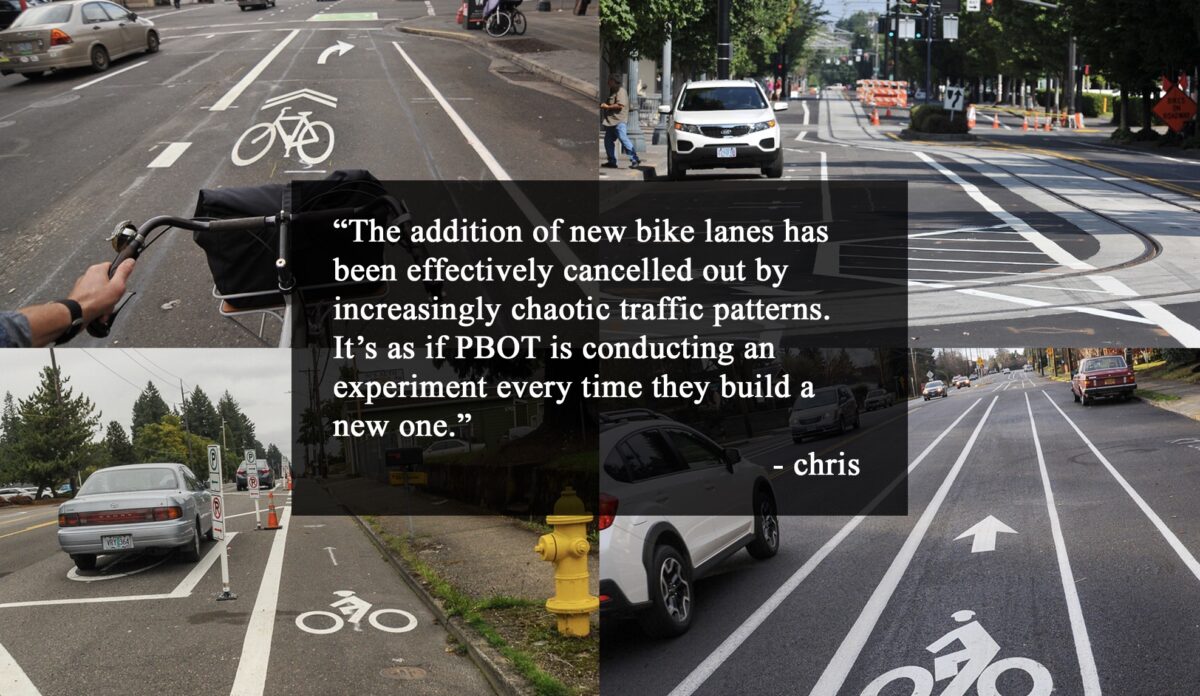
Our story based on a report about public sentiment and perception of transportation and the Portland Bureau of Transportation led to some interesting reader feedback. One part of the report several readers related to was the feeling expressed by focus group members that the city’s bikeway designs are not always consistent or intuitive.
Reader “chris” shared a thought that was nominated as Comment of the Week by several readers. Here it is (note that he begins by quoting parts of the report):
“I fully endorse putting bike lanes in… but it feels like they’re changing their minds continuously on how they want to do that. Some areas there are green stripes, some areas it’s on the edge, some areas it’s in the middle, some areas they’re taking the entire lane out.”
This is my criticism as well. Our bike lanes follow no best practice or uniformity of design. It’s as if PBOT is conducting an experiment every time they build a new one. It’s produced a lot of visual clutter that’s difficult sometimes for even me to parse, to say nothing of motorists from out of town that aren’t used to driving around bicyclists. Most of the designs aren’t very good, and the addition of new bike lanes has been effectively cancelled out by increasingly chaotic traffic patterns. It has not lead to an increase in bike ridership. As this blog has pointed out in the past, ridership has fallen by a percentage point, so new infrastructure clearly isn’t producing the desired result.
Advertisement
“I can control who’s in my space when I’m in my car, and I don’t have to worry about someone random bashing me in the back of my head while I’m driving… When you don’t know people, they could look completely normal, and next thing you know…” said one person. “I was one of the people that was on the MAX when [the stabbing happened]. Right after that is when I got my car,” said another. Bloom called this a, “Collective fear of other people and the uncertainty that comes with being around those you don’t know,” and determined that, “Portlanders generally feel safer in a car because they have some control over what happens to them and their families.”
This is a sentiment that should be taken seriously, as it’s widespread. Most people in Portland will vocally express support for more bike lanes and public transit, but in terms of their actual behavior, they’ll respond to incentives. Even if they recognize that it’s inefficient and wasteful for the majority of people in a city to drive, they’ll do what they perceive as being in their immediate self-interest. If the public space is dysfunctional and chaotic, people will armor up. Even if they’re miserable sitting in traffic, at least they get to be miserable in their own private bubble. If the city attempts to disincentivize driving by making it less convenient and more expensive while not improving the cycling and transit experience at all, people will react against a strategy that they see as all stick and no carrot. They will perceive the city transportation policies as malicious and actively reducing their standard of living.
I like chris’s comment because he includes the specific passage he’s reacting to, he makes well-reasoned points without insulting anyone (at least not in a direct/intentional way), and he uses good grammar and correct spelling (which helps in getting points across). Whether or not you agree with him, I hope you can appreciate a quality comment and be inspired to write more of them yourself.
Thanks for commenting chris!
— Jonathan Maus, (503) 706-8804, @jonathan_maus on Twitter and jonathan@bikeportland.org. Get our headlines delivered to your inbox. Support this independent community media outlet with a one-time contribution or monthly subscription.

